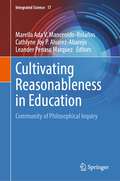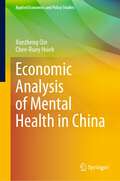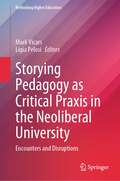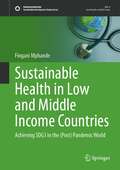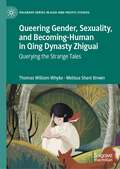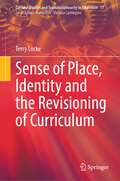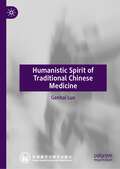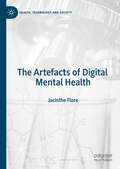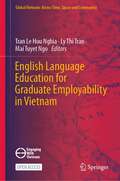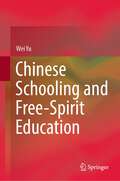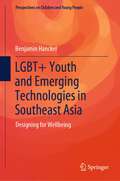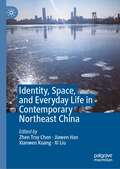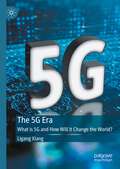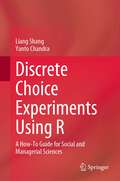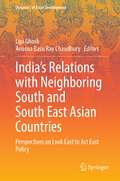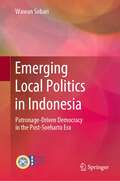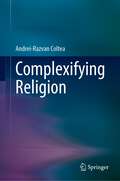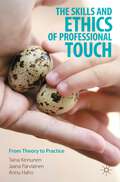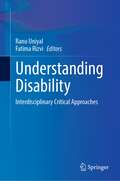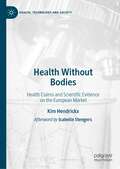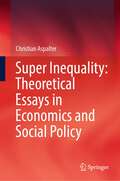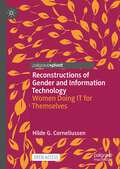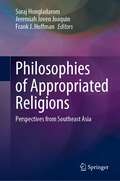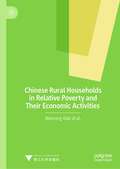- Table View
- List View
Cultivating Reasonableness in Education: Community of Philosophical Inquiry (Integrated Science #17)
by Marella Ada V. Mancenido-Bolaños Cathlyne Joy P. Alvarez-Abarejo Leander Penaso MarquezThis book focuses on the real-world application of the Philosophy for/with Children (P4wC) pedagogy to cultivate reasonableness in individuals through communities of philosophical inquiry. It presents a collection not only of theories but, more importantly, of experiences, discoveries, and innovations on P4wC by scholars, trainers, advocates, and practitioners around the world. Each chapter provides readers with insights and lessons that have resulted from the continuous application, exploration, and enrichment of the concepts, principles, and practices that were developed by Matthew Lipman and Ann Margaret Sharp into what P4wC is today - a dialogic pedagogical approach that may just be what is needed at a time when reasonableness and dialogue are essential to maintaining global stability and progress. In this light, this book also looks into how the P4wC approach can be practiced with adults such as when it is employed in various settings or contexts such as in business consulting, textbook writing, peace education, and extremism prevention, among others. Furthermore, this book also features chapters that discuss how the P4wC pedagogy can be beneficial once integrated into processes such as classroom teaching, teacher education, bioethics, and employee education. This book provides valuable insights about how reasonableness that is cultivated through building communities of philosophical inquiry in education can be a powerful tool for nation-building and social transformation.
Economic Analysis of Mental Health in China (Applied Economics and Policy Studies)
by Xuezheng Qin Chee-Ruey HsiehThis book uses an economic approach to analyze the socioeconomic causes and consequences of mental health disorders in China, with a special focus on mental depression. Based on a nationally representative dataset, we first investigate the prevalence and distribution of depression and depressive symptoms among China’s adult population, and then use several econometric methods to estimate the multi-dimensional disease burden of the mental disorder, such as its direct medical costs, its indirect economic costs, and its hidden costs on social trust and life satisfaction. In addition, we specifically address the socioeconomic determinants of mental health by examining how the relative and absolute economic status may determine people’s mental depression. Lastly, we propose an analytical framework to evaluate the four major hurdles that cause the treatment gaps of mental health care, and discuss the policy options to overcome such hurdles and to address the unmet mental healthcare needs in China and other developing countries. The book may facilitate our understanding on the complex determinants and implications of the rising prevalence of mental health disorders in developing countries like China. In addition to the students, teachers, and researchers in the fields of health economics and public health, the book may also be of interest to health policy makers and non-government agencies who are concerned with addressing the global mental healthcare challenges using economic policy tools.
Storying Pedagogy as Critical Praxis in the Neoliberal University: Encounters and Disruptions (Rethinking Higher Education)
by Mark Vicars Ligia PelosiThis book examines how teaching and learning and teacher and student identities are being reframed in higher education by neoliberal policies and practices. It shares how teachers perform teaching and learning duties in relation to prescribed institutional policies and how teachers insert dissonant pedagogies as a critical practice.The book explores narrative pedagogy as a disruptive presence and a space for critique. It interrogates personal/professional experience of educational systems that present educators juggling complexity and meeting competing demands to make learning meaningful for students. Each contribution will act as a counterpoint and provide a synoptic method for comparison. The book re-constructs meaning from the generic narrative of the public face of education, which homogenizes and diminishes collective understandings of teachers and teaching. This book provides a contemporary account of the social realities experienced within the higher education classroom across the globe.
Sustainable Health in Low and Middle Income Countries: Achieving SDG3 in the (Post) Pandemic World (Sustainable Development Goals Series)
by Fingani MphandeThis book highlights lessons from the COVID-19 pandemic and explains how these can be used to build sustainable health systems, especially in Low- and Middle-Income Countries (LMIC). It investigates the impact of outbreak response and management on health sustainability in LMIC from the perspective of SDG3: “Ensuring healthy lives and wellbeing for all at all ages”. Despite strides being made in some areas for SDG target 3.3 to fight communicable diseases, the COVID-19 pandemic has caused interruptions that will considerably affect vaccination coverage as well as the progress that was made, for example: in reducing malaria cases. Vulnerable populations who were already struggling to access their healthcare needs before the pandemic may face even greater challenges at present and in the years to come, post-pandemic. This book considers the progress on attaining the SDG3 targets, specifically: to improve early warning systems for management of national and global health risks, and the effect of pandemics - including but not limited to the COVID-19 pandemic - and emerging disease outbreaks. It explores the weaknesses and strengths in LMIC and how to strengthen capacities in these countries. The author also investigates and proposes approaches that can, or should, be implemented to ensure sustainable health systems in developing countries, including early warning systems, risk reduction, and the management of global and national health risks. This book is of great interest to public health professionals, infectious diseases experts, and epidemiologists, as well as students and researchers of public health systems and healthcare infrastructure in developing countries.
Queering Gender, Sexuality, and Becoming-Human in Qing Dynasty Zhiguai: Querying the Strange Tales (Palgrave Series in Asia and Pacific Studies)
by Thomas William Whyke Melissa Shani BrownThis book offers queer readings of Chinese Qing Dynasty zhiguai, ‘strange tales’, a genre featuring supernatural characters and events. In a unique approach interweaving Chinese philosophies alongside critical theories, this book explores tales which speak to contemporary debates around identity and power. Depictions of porous boundaries between humans and animals, transformations between genders, diverse sexualities, and contextually unusual masculinities and femininities, lend such tales to queer readings. Unlike previous scholarship on characters as allegorical figures or stories as morality tales, this book draws on queer theory, animal studies, feminism, and Deleuzian philosophy, to explore the ‘strange’ and its potential for social critique. Examining such tales enriches the scope of historic queer world literatures, offering culturally situated stories of relationships, desires, and ways of being, that both speak to and challenge contemporary debates.
Sense of Place, Identity and the Revisioning of Curriculum (Cultural Studies and Transdisciplinarity in Education #17)
by Terry LockeThis book explores intersections between sense of place, the formation of identity, indigeneity and colonisation, literature and literary study, the arts, and a revisioned school curriculum for the Anthropocene. Underpinning the book is a conviction that sense of place is central to the fostering of the change of heart required to secure the survival of human life on earth. It offers a coherent overview of seemingly disparate realities on a geographically and historically sprawling canvas. The book is a work of literary non-fiction, drawing on a range of sources: literary works and criticism, theoretical research, empirical studies and artworks. Of its very nature, the book enacts an extensive cultural critique. After establishing a cross-disciplinary foundation for “sense of place”, the book describes its relationship to identity with reference to such terms as attachment, dispossession, reclamation and representation. It shows how a hopeful narrative for planet stewardship can be developed by the uptake of indigenous and traditional discourses of place. It concludes with the envisioning of a place-conscious curriculum, and ways in which an activist agenda might be pursued in the Anthropocene.
Humanistic Spirit of Traditional Chinese Medicine
by Genhai LuoThis book aims to introduce in everyday language the profound culture and unique legacy of the ancient healing art with mesmerizing stories, allusions and anecdotes in the history of its evolution, handpicked from three perspectives, including contributions of master TCM practitioners, the nourishment of TCM by traditional Chinese culture, and the exchanges between TCM and its western counterparts. The vivid narrative of each section is complemented with elaboration of one related key TCM concept in a specific column. It is a brilliant reader for those interested in TCM and traditional Chinese culture.
The Artefacts of Digital Mental Health (Health, Technology and Society)
by Jacinthe FloreThe Artefacts of Digital Mental Health focuses on smartphone apps, wearables devices, and ingestible sensors, which are at the centre of research, development, and investment in mental health and digitalisation. The book aims to examine digital mental health through three artefacts that are defined by their ubiquity, everydayness, popularity, innovation and hype, and emergent qualities. It engages with theoretical approaches to technology, mental health, and wellbeing informed by Science and Technology Studies, sociological studies of health and mental health, and sociomaterialism. The book brings together different theories of mental health, subjectivity, the body, care, and digitalisation alongside biodigital artefacts as exemplars of transformations in digital mental health.
English Language Education for Graduate Employability in Vietnam (Global Vietnam: Across Time, Space and Community)
by Tran Le Huu Nghia Ly Thi Tran Mai Tuyet NgoThis open access book examines the teaching and learning of English for employability in Vietnamese higher education. Its content is framed within one country to better examine the research issues within the influence of contextual factors. This book investigates how English can contribute to the development of students' employability capitals, particularly in the aspects of human capital, social capital, cultural capital, identity capital, and psychological capital. It presents employers' and employees’ perspectives of how and why English is increasingly important for career development. This book is a collection of discussions and viewpoints from teachers, students, and other stakeholders like employers, graduates, and course coordinators on current practices and their proposed improvements to prepare students for their future education, work and life. Based on empirical evidence, this book calls for repositioning English language education within the employability agenda to elevate its status and increase stakeholders' engagement. This book contributes to current debates on advancing the effectiveness of English language education in non-English speaking countries, as a response to internationalization and globalization.
Chinese Schooling and Free-Spirit Education
by Wei YuReaching deep into the wealth of Chinese philosophical wisdom, this book offers rich insights into a way of educating that has found staunch advocates among educators through the ages. The ‘free-spirit education’, which calls on educators to respect and nurture the natural goodness of each child, affords an educational principle that is embedded in one of the most important Confucian classics: The Doctrine of the Mean. This book analyzes the meaning, history, principles, and educational application of ‘free-spirit education’ and also explores its contemporary development in the context of a school improvement initiative. It introduces the intellectual origins of ‘free-spirit education’, the application in ’process-based inductive teaching’ and cases from the field. It presents the collection of pedagogical cases that are rooted in the traditions of Chinese philosophic inquiry and viewed through the lens of contemporary pedagogy for human development. This book is a useful reference for university faculty, educational researchers, school teachers and leaders, graduate and undergraduate students in curriculum studies and in philosophy, social science, and education, curriculum developers, and all those educators who are interested in understanding ‘free-spirit education’—a key component of the humanistic traditions of Chinese education.
A Social View of Socotra Island: People, Culture, Heritage
by Nataša Slak Valek Ahmad Abdelmoniem ZedanThis book focuses on Socotra Island, geographically based in Yemen, and aims to explore the island from the social sciences point of view. This book focuses on people indigenous to Socotra, Socotri cultures, heritage and also offers contributions from business, tourism, linguistic, communication, and anthropology. While a lot has been published in natural science about Socotra’s endemic species, biodiversity, and nature in general, social scientific research of the island is very limited. This book addresses therefore addresses this gap and explores various topics of tourism, behaviours, cultures, and language.This book focuses on a clear social science approach of Socotra. The purpose of this book is to publish research about the people, behaviors, heritage, and potential tourism of Socotra. The Socotra Archipelago has long been a land of mystery. It is unknown as a tourism destination for many, however, is a popular destination for adventurers, photographers and travelers who like to travel to remote and undeveloped places. This book explains how Socotra has limited resources of electricity, which is provided by diesel generators, Internet is very slow and limited to certain points on the island. There are no shopping malls or five-star hotels. Roads, schools, and hospitals have been built only recently. This book shoes how these island people do not know the development as we do, which makes it principally interesting to research. Previous interviewers of Socotri people about tourism development in the island have faced many challenges such as language barriers, lack of understanding the meanings and interviewing content, lack of support for the anticipated research results. This book successfully undertakes this challenge as not only in understanding the language, but understanding phenomena like e.g. tourism. Whilst acknowledging the ways in which indigenous island people have never travelled or seen a developed city. Thus, words like ‘developed’, ‘tourism destination’ or ‘washing machine’ may be unfamiliar terms for them. Therefore, new and innovative research methods that are sensitive to Socotra people were implemented in the creation of this book.
LGBT+ Youth and Emerging Technologies in Southeast Asia: Designing for Wellbeing (Perspectives on Children and Young People #14)
by Benjamin HanckelThis book investigates the ways in which emerging digital technologies are shaping and changing the worlds of sexuality and gender diverse youth in Southeast Asia. Primarily focused on the Philippines, Indonesia, Singapore, Thailand, and Malaysia, the book examines the potential of digital technologies to enhance wellbeing in and across these contexts. Drawing on multi-site ethnographic field research, interviews, survey data, and online content analysis, the book examines the design and use of websites and content by and for LGBT+ youth. The book innovatively interrogates the design of transnational digital wellbeing initiatives, alongside the digital practices of those the technologies are designed for. It illustrates not only the (im)possibilities of technological design, but also the capacity for design to participate in what Hanckel calls ‘(trans)national digital wellbeing’ processes. He asks us to consider the ways that global technologies are contextual—a paradox that is explored throughout the book. The analysis extends important discussions in youth research, contributing to a greater understanding of how LGBT+ youth are engaging new technologies to participate in identity-making, health and wellbeing, as well as political action. It also considers implications for digital wellbeing and digital health promotion efforts globally with young people who experience marginalisation. In doing so the book makes a critical contribution to understanding the ways that transnational digital interventions get deployed and (at times) incorporated into youth practices.
Identity, Space, and Everyday Life in Contemporary Northeast China
by Zhen Troy Chen Jiawen Han Xianwen Kuang Xi LiuThis edited volume is first of its kind to document and critically analyse the changes took place snice China’s opening-up and reform and its impact on Dongbei, China’s North-East region, known for its remote and vast landscape, unique and othered culture, rich resources, mighty infrastructures and industries, geopolitical significance. Through presenting up-to-date and multidimensional case studies, the book covers three major aspects of Dongbei, which put people at the heart of our scholarly focus, namely people’s mediated life through traditional and new media; people’s social, cultural, and living spaces; artistic and fictional representations of people’s everyday life.
The 5G Era: What is 5G and How Will it Change the World?
by Ligang XiangThis book states that the seventh information revolution is the intelligent Internet, and 5G is the foundation of the seventh information revolution. This book gives a clear introduction to the three major scenarios, six characteristics, core technologies, and global landscape of 5G, and answers "What is true 5G?" This book also gives an in-depth explanation of 5G-enabled traditional industries, and outlines the profound changes that 5G will bring to transportation, medical, industry, and agriculture. Finally, the author made bold assumptions about the opportunities and challenges that human society faces in the post-5G era. For readers who want to fully understand 5G, this book provides an important reference and is a must-have book.
Discrete Choice Experiments Using R: A How-To Guide for Social and Managerial Sciences
by Liang Shang Yanto ChandraThis book delivers a user guide reference for researchers seeking to build their capabilities in conducting discrete choice experiment (DCE). The book is born out of the observation of the growing popularity – but lack of understanding – of the techniques to investigate preferences. It acknowledges that these broader decision-making processes are often difficult, or sometimes, impossible to study using conventional methods. While DCE is more mature in certain fields, it is relatively new in disciplines within social and managerial sciences. This text addresses these gaps as the first ‘how-to’ handbook that discusses the design and application of DCE methodology using R for social and managerial science research. Whereas existing books on DCE are either research monographs or largely focused on technical aspects, this book offers a step-by-step application of DCE in R, underpinned by a theoretical discussion on the strengths and weaknesses of the DCE approach, with supporting examples of best practices. Relevant to a broad spectrum of emerging and established researchers who are interested in experimental research techniques, particularly those that pertain to the measurements of preferences and decision-making, it is also useful to policymakers, government officials, and NGOs working in social scientific spaces.
India’s Relations with Neighboring South and South East Asian Countries: Perspectives on Look East to Act East Policy (Dynamics of Asian Development)
by Lipi Ghosh Anasua Basu Ray ChaudhuryThis book presents a holistic perspective across various facets of culture, history, politics, economics and strategy in India’s relations with neighbouring South and Southeast Asian countries. This book not only analyses various issues of India’s foreign policy diplomacy but also explores the perspectives of neighbouring countries towards India. It engages experts from India and its South and Southeast Asian neighbours to discuss topics, such as overland linkages, people-to-people interactions, opportunities and implications of India’s Act East policy on its neighbours in changing geopolitical backdrop. The book emphasises on the responses to the COVID-19 pandemic and suggests a greater scope of regional cooperation on emergencies such as health crises in the Bay region. This rich collection of essays has strategic and scholarly relevance for researchers working on a wide range of topics related to development studies, cultural studies, Asian studies as well as policy makers and general readers.
Emerging Local Politics in Indonesia: Patronage-Driven Democracy in the Post-Soeharto Era
by Wawan SobariThis book provides a richer understanding of democratic local politics in Indonesia after the implementation of local direct elections in 2005. Co-published with the University of Airlangga Press, it confronts the question as to why incumbent political leaders succeed and fail in their bid for re-election. By focusing on urban and rural districts in East Java, one of the most populated regions in Indonesia, the work unpacks the general trends of local Indonesian politics, drawing from an empirically sound and theoretically well-grounded case study. The author demonstrates that good policy performance does not guarantee the political survival of the incumbent, and reversibly, bad policy performance does not necessarily mean losing political power. It considers the core political strategies of populism, rivalry, and tangibility and cautions that—rather than helping liberal democracy to grow—these strategies support patronage-driven democracy. Within this system, a small number of vital protectors and defenders control patronage, and, problematically, exert influential control over the country’s electoral processes. Relevant to scholars and students in Indonesian studies, and within political science and Asian studies more broadly, this book follows a gripping and nuanced narrative that explains the relationship between policy choices, informal politics, voting behavior, and political survival in Indonesia.
Complexifying Religion
by Andrei-Razvan ColteaThis book provides an original and challenging perspective of religions as abstract complex adaptive systems, using an interdisciplinary approach to try to understand what religions are and how they function, two fundamental issues which, despite an intense struggle from several fields, have not yet been resolved. What is the source of religious belief? How do religions work and what are they made of? Why is religion so important for us that it has survived centuries of scientific progress and secularization? Why are people religious even outside religion? The book addresses these questions using an interdisciplinary approach that seeks to untangle the Gordian knot of defining religion. In short, they can be considered entropy-reducing technologies. What differentiates them from other meaning-producing systems is their configuration which employs specific building blocks as tools for mitigating entropy, which are also subsystems and combine in various ways to build a unique configuration: rituals, myths, taboos, supernatural agents, authority, identity, superstitions, moral obligations, afterlife beliefs and the sacred. As a reaction to perturbances or pressure, systems can collapse. Inspired by Nicholas Nassim Taleb, it is, in this book, referred to as fragility—the negative reaction of systems to random events, and four parameters can be used to evaluate it in religious systems: monotonicity (the inability to learn from past mistakes), coupling (linking with other systems: such as political or economic), centralization and stress starvation. Several case studies are provided in order to test the theoretical claims made in this book, based on the author's field research in Romania, Japan, North Korea and Mongolia, and offering details that could be of interest to casual readers, students and researchers of religion.
The Skills and Ethics of Professional Touch: From Theory to Practice
by Taina Kinnunen Jaana Parviainen Annu HahoThis book introduces readers to the ethical and goal-oriented functions of touch in professional practice. Touch is both an increasingly visible topic today and a core skill in many professions, especially in health, education and social work. This book combines helpful theoretical discussions and practical information, offering a balanced and culturally-informed introduction to an issue that both students and professionals often find difficult to navigate. Chapters discuss the various functions of touch and its uses, giving readers a deeper understanding of the potential of tactile work practices. The authors offer clear legal and ethical guidance to empower learners. They discuss key issues such as harmful touch and the increasing digitisation of patient work. Activities, case studies and further readings promote learning and help readers reflect on their own relationship to touch. This book will be an invaluable resource for students in undergraduate and graduate courses in healthcare, nursing, education and social work, and to practitioners looking for guidance on this topic.
Understanding Disability: Interdisciplinary Critical Approaches
by Ranu Uniyal Fatima RizviThis edited volume brings together contributions on disability studies organized around two themes: literary and sociological aspects. The contributors include academics, disability activists, and researchers from within and outside the Indian periphery. While the book strengthens the disability discourse and contributes to building academic scholarship on this subject, it also promotes disability activism by giving space to both direct practitioners and persons with disabilities. The chapters discuss various analytical and literary aspects of the marginalization experienced by the disabled community and bring forth new and elaborate perspectives. It draws connections across multiple identities and includes personal narratives across nations, cultures and societies. It is an excellent research resource on disability studies in India for scholars and students in the area of humanities, education, law, sociology and social work, while at the same time also addressing the global context.
Health Without Bodies: Health Claims and Scientific Evidence on the European Market (Health, Technology and Society)
by Kim HendrickxHealth Without Bodies invites readers on an ethnographic exploration of the boundary between food and medicine. Food-related health claims are governed in the EU as voluntary statements on food labels to help consumers make ‘informed choices’. This poses an interesting problem: when claims refer to health, one can no longer ignore that consumers have bodies. Asking how these claims have become possible as a new kind of truth-statement on the market, this book reveals the contours of a fundamental tension between what is expected from consumers in a liberal market economy, and how food and the body come to trouble those expectations. In doing so, it illuminates why the difference between food and medicine is such a sensitive issue, and why seemingly trivial health claims have been subject to so much debate and political control.
Super Inequality: Theoretical Essays in Economics and Social Policy
by Christian AspalterThis book bridges the disciplines of micro-economics and social policy in general, and, in particular, behavioral/explanatory social policy and public choice theory, plus Leibenstein’s X-efficiency theory. Being trained as an economist and social policy scientist, the author leaps out of the comfort zone of most social policy scientists and experts, right into the exciting world of micro-economic theory, and then extending and connecting those theories to explain major social, political and economic conundrums of our time. In doing so, the book offers a new set of theoretical—and practical—explanations derived from the general proposition of micro-economic theory, of how government officers, policymakers, administrators and the people themselves alike are, by and large, motivated in their daily as well as strategic (long-term) decision-making. Using a meta-analytical approach (based on a number of grand theories), this book also explains systemic factors behind human behavior and the thereof resulting shortcomings in lifetime outcomes (health, wealth and happiness of a person) and at the same time societal, policy-making, and economic outcomes on societal level, and in global comparison.The outcomes thereof can be measured exactly (and hence validated), especially through the method of empirical comparative social science/economic research. Here, the author also (but not only) introduces the new method of using Aspalter's Standardized Relative Performance (SRP) Index in measuring exactly complex, aggregate performances of multiple governments, and that at the same time also across the entire world.
Reconstructions of Gender and Information Technology: Women Doing IT for Themselves
by Hilde G. CorneliussenThis open access book explores what makes women decide to pursue a career in male-dominated fields such as information technology (IT). It reveals how women experience gendered stereotypes but also how they bypass, negotiate, and challenge such stereotypes, reconstructing gender-technology relations in the process. Using the example of Norway to illuminate this challenge in Western countries, the book includes a discussion of the “gender equality paradox”, where gender equality exists in parallel with gender segregation in fields such as IT. The discussion illustrates how the norm of gender equality in some cases hinders rather than promotes efforts to increase women’s participation in technology-related roles.
Philosophies of Appropriated Religions: Perspectives from Southeast Asia
by Soraj Hongladarom Jeremiah Joven Joaquin Frank J. HoffmanThis book brings together different intercultural philosophical points of view discussing the philosophical impact of what we call the ‘appropriated’ religions of Southeast Asia. Southeast Asia is home to most of the world religions. Buddhism is predominantly practiced in Thailand, Vietnam, Myanmar, Singapore, Laos, and Cambodia; Islam in Malaysia, Indonesia, and Brunei; and Christianity in the Philippines and Timor-Leste. Historical data show, however, that these world religions are imported cultural products, and have been reimagined, assimilated, and appropriated by the culture that embraced them. In this collection, we see that these ‘appropriated’ religions imply a culturally nuanced worldview, which, in turn, impacts how the traditional problems in the philosophy of religion are framed and answered—in particular, questions about the existence and nature of the divine, the problem of evil, and the nature of life after death. Themes explored include: religious belief and digital transition, Theravāda Buddhist philosophy, religious diversity, Buddhism and omniscience, indigenous belief systems, divine apology and unmerited human suffering, dialetheism and the problem of evil, Buddhist philosophy and Spinoza’s views on death and immortality, belief and everyday realities in the Philippines, comparative religious philosophy, gendering the Hindu concept of dharma, Christian devotion and salvation during the Spanish colonial period in the Philippines through the writings of Jose Rizal, indigenous Islamic practices in the Philippines, practiced traditions in contemporary Filipino celebrations of Christmas, role of place-aspects in the appropriation of religions in Southeast Asia, and fate and divine omniscience. This book is of interest to scholars and researchers of philosophy of religion, sociology of religion, anthropology of religion, cultural studies, comparative religion, religious studies, and Asian studies.
Chinese Rural Households in Relative Poverty and Their Economic Activities
by Wenrong QianThis book summarizes the new economic phenomenon and problems of rural families in China from the perspective of relative poverty. Based on the data of China Rural Household Panel Survey (CRHPS), a nationwide on-site survey conducted door to door by Zhejiang University, this book focuses on the theme of relative poverty and provides a systematic analysis of the economic activities of rural households in three main aspects: agricultural production and management, land utility and transfer, and migration of rural households and citizenization of migrant workers. Besides, this book also explores focuses on the performance of relatively poor households in terms of agricultural production, land transfer, non-farm employment and social security, and provides a basic mapping of the situation of relatively poor households in rural China, so as to provide a scientific basis for improving the living standards of rural households, establishing a long-term mechanism for poverty alleviation. CRHPS not only includes individual-level and household-level data, but also corresponding community-level data, which makes it possible to conduct a comprehensive study of the rural households. Researchers of Chinese rural problems and government officials (especially the department of agriculture officials) will find this book especially interesting.
